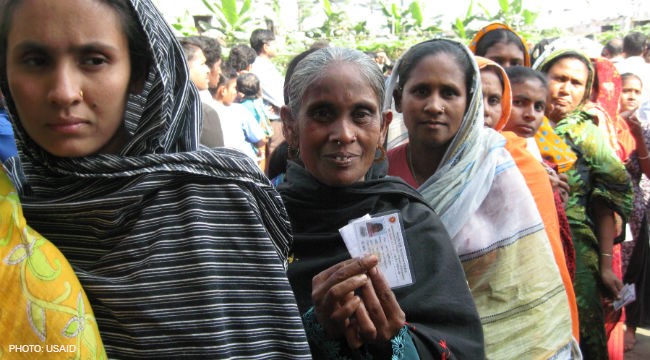
Promoting good governance and accountability is critical to advancing economic growth, health, education, and the ability to provide high-quality public services. In Bangladesh, USAID strengthens institutions of good governance, promotes human rights, combats trafficking in persons, and seeks to improve labor conditions for Bangladeshi workers.
USAID works with public institutions to reduce corruption, increase transparency of government, and increase accountability. We also help incorporate digital technology to improve efficiency of public services throughout the country, including electronic land titling, birth registration, and university applications.
To increase access to the formal justice system, USAID educates underserved citizens about existing legal aid services and provides training to the justice sector to more efficiently serve the public. We are also committed to addressing human rights violations and reducing the high prevalence of violence against women, sexual harassment, child marriage, and domestic abuse. USAID leads campaigns to prevent human trafficking and trains government officials to better care for survivors and more effectively prosecute the perpetrators.
With the help of international attention and working with the donor community, international buyers, government officials, and labor organizations, USAID supports the formation of democratic labor unions through which workers can advocate for their rights. USAID’s Global Labor Program trains workers on labor laws, provides legal support to labor organizers, and assists workers in organizing and registering new unions. USAID also negotiated two agreements with the Bangladesh government to support workplace safety and labor programs in the fish and shrimp industry. Through a Global Development Alliance, USAID will also train garment factory owners, managers, and workers about safe working practices.
In 2015, USAID programs in Bangladesh
- Trained nearly 500 local government institutions to improve their ability to provide basic services and created citizen forums in each of these communities to increase citizen input on local government activities.
- Trained 29,000 political party activists from across the political spectrum to increase political parties’ responsiveness and improve internal coordination through party conferences and councils.
- Provided technical assistance on labor laws, provided legal support to labor organizers, and assisted workers in organizing and registering 45 new unions.
Shahara Khatun, 28, makes blazers in a factory in Gazipur, a district of Dhaka. With her income she supports her parents, husband and two sons. She had to leave the comfort of family in their home village 4 hours away, to find a job that could provide for them after her husband became ill and could no longer work to support the family. When she first started at the factory 7 years ago, conditions were rough. She did not get paid on time, she didn’t have paid leave, and they couldn’t talk to management to address problems. After joining a trade union supported by USAID, Shahara learned about workers’ rights and labor laws. Her union elected her as the general secretary and together they negotiated better working conditions at the factory. Now, they can discuss issues with management, they get paid on-time, they have daycare at the factory to keep their children, and they have scheduled leave. With her income, she supports her eldest son’s education and has bought a plot of land next to her parents’ house where she’ll build a new house for her family.
Learn more in our Medium post: Remembering the Workers of Rana Plaza








Comment
Make a general inquiry or suggest an improvement.